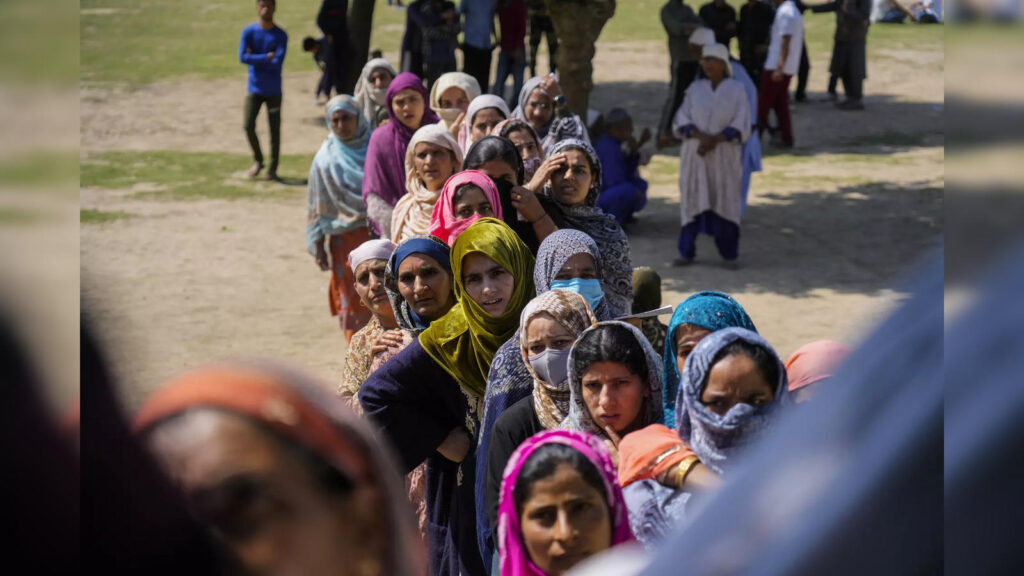Between September 18 and October 1, 2024 Jammu and Kashmir will see first Assembly elections in five years—a first since the abrogation of Article 370 in 2019.
Elections to J&K’s 90 Assembly seats, being held along with the Haryana Assembly polls due on October 5 are similar to the 1962 Assembly polls in the state—turned—union—territory. The 1962 polls were held simultaneously with the Lok Sabha and state assembly elections across the country between February and April that year. Despite being J&K’s third election since Independence, the 1962 polls were first to be conducted thereby by the Election Commission of India.
Before 1962, the EC was not responsible for conducting the J&K election in 1957 or those for the Constituent Assembly (a body of representative elected to formulate the Constitution of J&K) in 1951.On November 17, 1956, the Constitution Assembly adopted the Constitution of J&K under the Constitution of India. This decision came into effect on January 26, 1957, even as preparation for general election across India were on.
Though the J&K Assembly polls were also held in 1957 as per the state Constitution, they were over seen by the Election Commission appointed by the Sadr-e-Riyysat. On January 26, 1960, the state Constitution was amended to hand over election work to the EC. J&K was not in the limelight that finds itself under in 2024. With 71 returning officers and 40 assistant returning officers managing the polls, there were over 18 lakh eligible voters. The Legislative Assembly had 100 members by direct election, but 25 seats were kept vacant and the area 0f J&K under Pakistan occupation was excluded from delimitation.
Interestingly, earlier there were 67 single –member constituencies and four two-member constituencies in J&K. But in 1961, as in other parts of the country, two—member constituencies were abolished, and reservation for the scheduled caste and scheduled Tribes was provided only on single member seats. In J&K too, the four two member constituencies were split into eight one-member seats. In J&K too taking, the four two member constituencies were split into eight one-member seats, taking the total member of seats to 75.
For the EC, the biggest hurdle while fixing the 1962 poll schedule was the weather in J&K. The other challenge was holding these elections simultaneous with the Lok Sabha and state Assembly polls across India. Though the EC realized that April was the most suitable month to hold elections in the snow—capped state, the Jammu region went to polls on February 24, while Kashmir and Ladakh regions exercised their universal adult franchise on March 15, 1962. It was decided that the entire election process would be completed before March 31.
In the 1957 Assembly polls, candidates—from the Jammu and Kashmir National Conference (JKNC), the prime political party in the state—returned unopposed on 43 seats. Of 75 Assembly seats in that election, the JKNC won 69, the Praja Parishad five and Harijan Mandal one. The JKNC election symbol was the same as Congress—a pair of bullocks carrying a yoke. The Praja Parisad’s symbol was the rising sun, while the Harijan Mandal’s was a standing lion.
In the 1962 polls, JKNC candidates returned unopposed on 34 seats. In 41 others constituencies, 140 candidates contested. In these 41 seats, JKNC won 36, Praja Parishad three, and two Independents won the remaining two seats. The other parties lost their deposits. In some polling stations, in four constituencies, fresh polls were ordered due to allegations of serious irregularities. The expenditure incurred by the state on election, including electoral rolls and setting up of 1,223 polling stations, was just Rs. 2,92649.
With the JKNC sweeping the polls, J&K PM Bakshi Ghulam Mohammed continued to lead the state. However, these elections were not free of their share of controversy. Some Opposition partied threatened to boycott the polls, alleging that they were not “ free and fair”. The Praja Socialist Party and G M Sadiq’s Left-leaning Democratic National Conference had issued a joint statement saying that the “ruling National Conference was fanning feeling of provincialism and regionalism” and announced that they were boycotting the polls. However, the PSP ended up contesting from six seats and the DNC from 20—both failed to secure a single seat’. (IPA Service)




